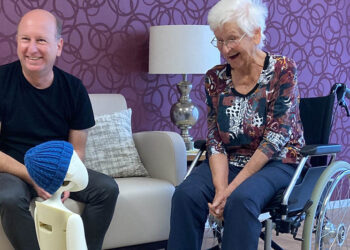Europe’s ageing population brings with it a challenge: More and more people are affected by cardiovascular disease in old age. According to a recent overview by The Lancet Regional Health – Europe older adults are not only disproportionately affected, but are also less likely to receive optimal treatment.
Why older people are not treated optimally
With age, not only do the risks of heart attack, stroke or heart failure increase, but also the complexity of treatment. Many patients suffer from several illnesses at the same time, have to take numerous medications and are more susceptible to side effects. In addition, there are age-related physiological changes and often cognitive impairments.
There is too little data and guidelines on this complexity on which doctors can base their treatment. This is because people over the age of 75 are heavily underrepresented in clinical studies. Many therapies are based on data from younger patient groups, meaning that there is a lack of evidence-based recommendations for older people. As a result, guidelines fall short and older patients often receive less intensive or delayed treatment.
In addition to medical factors, social inequalities also increase the risks. Financial constraints, limited access to healthcare services – especially in rural areas – and social isolation make it difficult to provide continuous care. Studies show that older adults with cardiovascular disease are more likely to be lonely and therefore have an additional increased risk of deterioration.
There are also more and more very old and frail people: Almost one in three people over 85 are affected. This means that their body and strength are weakening. Those affected are more susceptible to complications, falls and more serious illnesses.
What heart disease has to do with dementia
Heart disease and dementia are closely linked. If you have a weak heart, you also have a higher risk of memory problems – and vice versa. Vascular dementia is triggered by a change in blood flow in the brain. Why this is the case: the heart supplies the brain with oxygen and nutrients via the blood vessels. If the heart or blood vessels are diseased, this has a direct impact on brain health. High blood pressure, arteriosclerosis or cardiac arrhythmia can lead to vascular damage in the brain, which favors dementia.
If the heart is weak, less blood is pumped to the brain, which means that the nerve cells are not supplied with sufficient oxygen. Strokes, which are often the result of atrial fibrillation or vascular problems, are also considered an important risk factor for dementia. This is the second most common form of dementia and is responsible for around 25 percent of cases.
In addition, risk factors such as smoking, diabetes, obesity or lack of exercise damage both the heart and the brain. Studies therefore clearly show that people with cardiovascular disease have an increased risk of developing dementia. Conversely, cognitive impairments often make the treatment of heart disease more difficult. Put simply, a healthy heart also protects the brain – which is why cardiac therapy and dementia prevention must always be considered together.
The experts’ recommendations
Unsurprisingly, a healthy lifestyle is also emphasized as central in this study. It emphasizes that lifestyle changes continue to have an effect even in old age: Stopping smoking measurably extends life expectancy, while a nutritious diet counteracts high blood pressure and diabetes. Regular exercise – even moderate activity such as walking – reduces the risk of falls, improves heart function and increases quality of life.
The WHO therefore recommends that older adults get at least 150 minutes of moderate exercise per week as well as targeted strength and balance exercises. However, according to European data, only a small proportion of people over 65 meet these recommendations.
In the view of the authors of the study, it is no longer enough to simply treat the disease itself in older patients. Care must focus much more on maintaining quality of life, independence and suitability for everyday life.
The Lancet Commission proposes a series of concrete measures to improve the care of older people with cardiovascular diseases. Close cooperation between different specialties is particularly important: Heart specialists, geriatricians and GPs should work together to develop individual strategies for their patients. Medication treatment must also be adapted more closely, as older people often take many medications at the same time and react more sensitively to dosages. Equally important, according to the experts, is consistent prevention, which includes vaccinations – for example against influenza -, nutritional advice, exercise programs and help with quitting smoking. To make future recommendations even more appropriate, older people should also be specifically included in medical studies. Finally, more social support is needed to relieve the burden on relatives and carers and ensure long-term care.
In other words, a holistic approach that combines medicine, prevention, social factors and quality of life is crucial to mastering the challenges of an ageing society. However, there are still gaps between the medical possibilities, the guidelines and the reality of older patients.
Read more about this:
Author: Anja Herberth
Chefredakteurin















